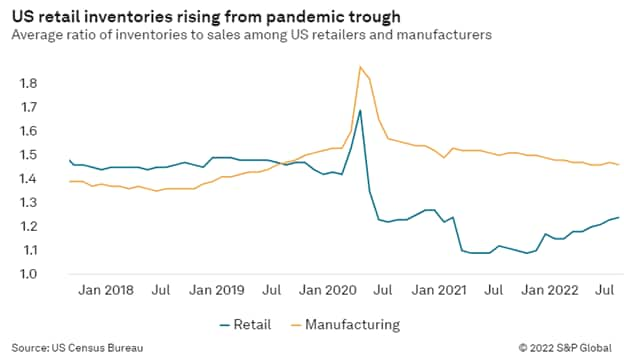Featured Topics
Featured Products
Events
S&P Global Offerings
Featured Topics
Featured Products
Events
S&P Global Offerings
Featured Topics
Featured Products
Events
S&P Global Offerings
Featured Topics
Featured Products
Events
Financial and Market intelligence
Fundamental & Alternative Datasets
Government & Defense
Banking & Capital Markets
Economy & Finance
Energy Transition & Sustainability
Technology & Innovation
Podcasts & Newsletters
Financial and Market intelligence
Fundamental & Alternative Datasets
Government & Defense
Banking & Capital Markets
Economy & Finance
Energy Transition & Sustainability
Technology & Innovation
Podcasts & Newsletters
BLOG — Dec 15, 2022
Discount retailers in the US are expanding their distribution networks under the strain of inventory that is shifting from higher-end stores to bargain outlets. That shift will eventually free up scarce warehousing space and improve supply chain fluidity, but the process could last well into 2023, retailers say.
US inventory and sales data released by the US Census Bureau Thursday shows goods are moving faster through supply chains and stores, but that overall stockpiles are still stuck at elevated levels.
Ollie's Bargain Outlet — a discount retailer with nearly 470 stores in the US — plans to expand its distribution facility in York, Pennsylvania, and open a fourth distribution center in the Midwest in the first half of 2023 to meet continued high consumer demand for lower prices amid high inflation.
"We have agreed to purchase land in Princeton, Illinois," for a new distribution hub, John Swygert, Ollie's president and CEO, said during an earnings call last week. Combined with the expansion in Pennsylvania, "our distribution center network will be able to support over 700 stores," he said.
That's a sign of how much business Ollie's believes it stands to gain as inflation-battered consumers search for bargains. Although the rate of inflation is slowing, it is still far above the 2 percent target set by the US Federal Reserve. The October consumer price index was up 7.7 percent year over year.
Squeeze the inventory balloon at one end of the market, and goods rush to the other end, driving greater growth in stores, warehouses, and distribution facilities among discounters.
The expanding distribution footprint in the bargain retail sector is the latest consequence of the inventory buildup that began early this year as shippers shifted large amounts of imports to the first half, hoping to avoid the supply chain disruption and stockouts they suffered in 2021.
Inventories rise, but move faster
The inventory and sales data released by the Census Bureau Thursday showed retailers are struggling to reduce inventories, as measured by dollar value. Total business inventories, unadjusted for seasonality, rose 1.7 percent in October from September, and were up 16.4 percent from October 2021.
There were some significant changes in specific retail sectors that indicate goods are moving off shelves at a faster pace. The inventory-to-sales ratio at general merchandise stores stayed between 1.56 and 1.58 from May through August, then dropped to 1.49 in September and 1.45 in October.
Furniture, home furnishings, electronics, and appliance stores had a ratio of 1.58 in October, compared with 1.71 in July and 1.65 in February 2019. Those stores hit a low ratio of 1.25 in January 2021 and were only back to 1.33 in September 2021. The inventory acceleration in 2022 is clear in the Census Bureau data.
A lower inventory-to-sales ratio means goods are moving more rapidly, creating, in theory, greater need for replenishment. The overall US retail inventory-to-sales ratio dropped from 1.25 in September to 1.22 in October, exactly where it was in July 2020 in the immediate aftermath of the COVID-19 recession.
Inventories remain far above year-ago levels, however, which is why retailers need more warehousing and distribution space and time to clear their shelves. "We see inventory returning to normalized levels by the end of the spring/summer 2023 season," Jerome Griffith, CEO of Land's End, said earlier this month.
Ollie's increased its inventory 11 percent year over year in the third quarter to $524 million, thanks in part to an increased number of stores, the timing of deliveries, and higher supply chain costs. Pressure on transportation costs "continues to ease," Swygert told investment analysts.
Ollie's is seeing "good activity" in flooring, automotive, lawn and garden, domestics, and housewares, Swygert said. "We think we're going to continue to see momentum," he said. "With the overall inventory challenges that people are facing, a lot of goods are sitting in warehouses."
Subscribe now or sign up for a free trial to the Journal of Commerce and gain access to breaking industry news, in-depth analysis, and actionable data for container shipping and international supply chain professionals.
Sign-up to Maritime Trade & Supply Chain monthly newsletter.
This article was published by S&P Global Market Intelligence and not by S&P Global Ratings, which is a separately managed division of S&P Global.